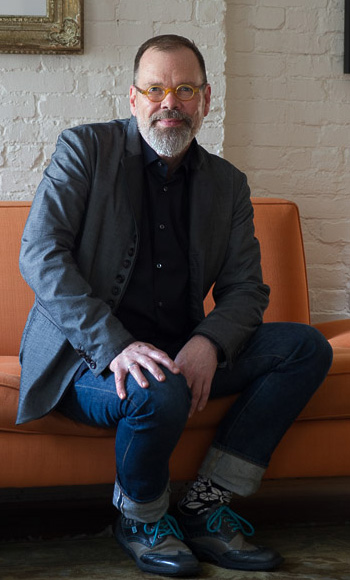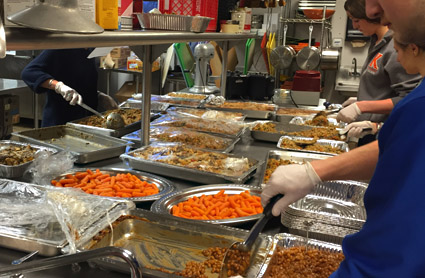
What does the annual celebration of Martin Luther King Jr.–his achievements and his ideas–mean for the present moment, what K students’ might term “our moment?” How should his spirit apply–in imagination, in word, in action–to their now and their future?
These are questions posed by and to students by and to the College’s Intercultural Center. The answers to those questions (both continually developing) will inform Kalamazoo College’s 2017 Martin Luther King Jr. Convocation on January 16, 2017.
As in the past, K’s activities will be part of various city events on that day. The 2017 MLK celebration Kalamazoo-wide theme is “The Transformative Power of a Unified Dream.”
Director of Intercultural Student Life (ISL) Natalia Carvalho-Pinto and students worked together to shape a celebration that creates opportunities to “consider what transformative power and resistance mean for new generations,” says Carvalho-Pinto. The ISL theme for this year’s K events is “Transformative Power and Resistance in the New Century: What Does ‘The Dream’ Look like Today?”
The day will feature four events, beginning with a convocation address by poet Danez Smith (10:50 a.m. in Stetson Chapel). The title of his talk is the same as the theme for K’s events, and it is free and open to the public.
Smith is the award-winning author of [insert] Boy (YesYes Books, 2014) and hands on ya knees (Penmanship Books, 2013), and he is a founding member of the multi-genre, multicultural Dark Noise Collective. His writing has appeared in Poetry, Ploughshares, Beloit Poetry Journal, and Kinfolks, among others.
His poems focus on intersecting matters of race, class, sexuality, faith and social justice, and it is characterized by a power, rhythm and imagery that invites and demands a reimagining of the world.
Smith then will lead a poetry workshop (12:30 p.m. Hicks Banquet Room, lunch provided) that is open to K students only. The workshop–titled “Future Tense: Poetry as Blueprint”–will explore the use of poetry to imagine realistic utopias in the not so distant future, and how those futures can allow us to reverse engineer the steps we would need to take to make them. “By looking at speculative worlds of some of today’s young poets of color,” says Carvalho-Pinto, “the workshop will inspire us toward change, possibility, action, dreaming and building the worlds we deserve.”
At 4 p.m. (gathering at Red Square) K students, faculty and staff will join their counterparts from Western Michigan University to walk to Martin Luther King Jr. Park in downtown Kalamazoo. Transportation back to K’s campus will be provided.
The afternoon’s poetry workshop will culminate at 6:30 p.m. with a reading in the Intercultural Center (Hicks). Students will share relevant writings and reflections–their own and that of others, some perhaps written that day during the workshop–about the day’s theme and celebrations. “The potential power of this event is extraordinary,” says Carvalho-Pinto. “We did this at Ferris [State University], and it was one of my favorite events.” The reading is open to the entire Kalamazoo College community, as is the film that will follow at 7:30 p.m. ISL has tentatively scheduled a screening of The Rosa Parks Story (starring Angela Bassett).
“We’re very excited about this year’s events,” says Carvalho-Pinto, “especially their potential to get us thinking about how what we celebrate on this day should infuse our present and future. And I’m particularly thrilled that Danez Smith will be a part.”
***
if you press your ear to the dirt
you can hear it hum, not like it’s filled
with beetles & other low gods
but like a mouth rot with gospel
& other glories. listen to the dirt
crescendo a boy back.
come. celebrate. this
is everyday. every day
holy. everyday high
holiday. everyday new
year. every year, days get longer.
time clogged with boys. the boys
O the boys. they still come
in droves. the old world
keeps choking them. our new one
can’t stop spitting them out.
-from “summer, somewhere,” by Danez Smith, Poetry, January 2016


 In May of 2013 alumnus David France ’81 returned to Kalamazoo College’s campus to present his Oscar-nominated documentary “How to Survive a Plague.” David has recently written and published a book of the same title, How to Survive a Plague: The Inside Story of How Citizens and Science Tamed AIDS. On November 21, the New York Times published a rave
In May of 2013 alumnus David France ’81 returned to Kalamazoo College’s campus to present his Oscar-nominated documentary “How to Survive a Plague.” David has recently written and published a book of the same title, How to Survive a Plague: The Inside Story of How Citizens and Science Tamed AIDS. On November 21, the New York Times published a rave 
 About 75 people from 17 private liberal arts higher-education institutions and 11 nations met Oct. 23-25 at Kalamazoo College for a civic engagement conference. “Civic Engagement and the Liberal Arts: Local Practice, Global Impact,” an Institute of the Global Liberal Arts Alliance, was hosted by the Mary Jane Underwood Stryker
About 75 people from 17 private liberal arts higher-education institutions and 11 nations met Oct. 23-25 at Kalamazoo College for a civic engagement conference. “Civic Engagement and the Liberal Arts: Local Practice, Global Impact,” an Institute of the Global Liberal Arts Alliance, was hosted by the Mary Jane Underwood Stryker  The tension between what is politically possible under the world’s current political and economic systems and what is ecologically necessary exposes an urgent need for change, said journalist and activist Naomi Klein, keynote speaker for the conference, “Without Borders, Post-Oppression Imaginaries and Decolonized Futures.” The conference was sponsored by the
The tension between what is politically possible under the world’s current political and economic systems and what is ecologically necessary exposes an urgent need for change, said journalist and activist Naomi Klein, keynote speaker for the conference, “Without Borders, Post-Oppression Imaginaries and Decolonized Futures.” The conference was sponsored by the 
 Nora Naranjo Morse will deliver the annual Phi Beta Kappa lecture at Kalamazoo College on Tuesday, October 11, at 8 p.m. in the Mandelle Hall Olmsted Room. The event is free and open to the public. Morse Morse is a sculptor, writer, and producer of video films that look at the continuing social changes within Pueblo Indian culture. Her talk, “Numbe Wahgeh,” focuses on the historical treatment of the Pueblo people and history retold by indigenous peoples.
Nora Naranjo Morse will deliver the annual Phi Beta Kappa lecture at Kalamazoo College on Tuesday, October 11, at 8 p.m. in the Mandelle Hall Olmsted Room. The event is free and open to the public. Morse Morse is a sculptor, writer, and producer of video films that look at the continuing social changes within Pueblo Indian culture. Her talk, “Numbe Wahgeh,” focuses on the historical treatment of the Pueblo people and history retold by indigenous peoples.

